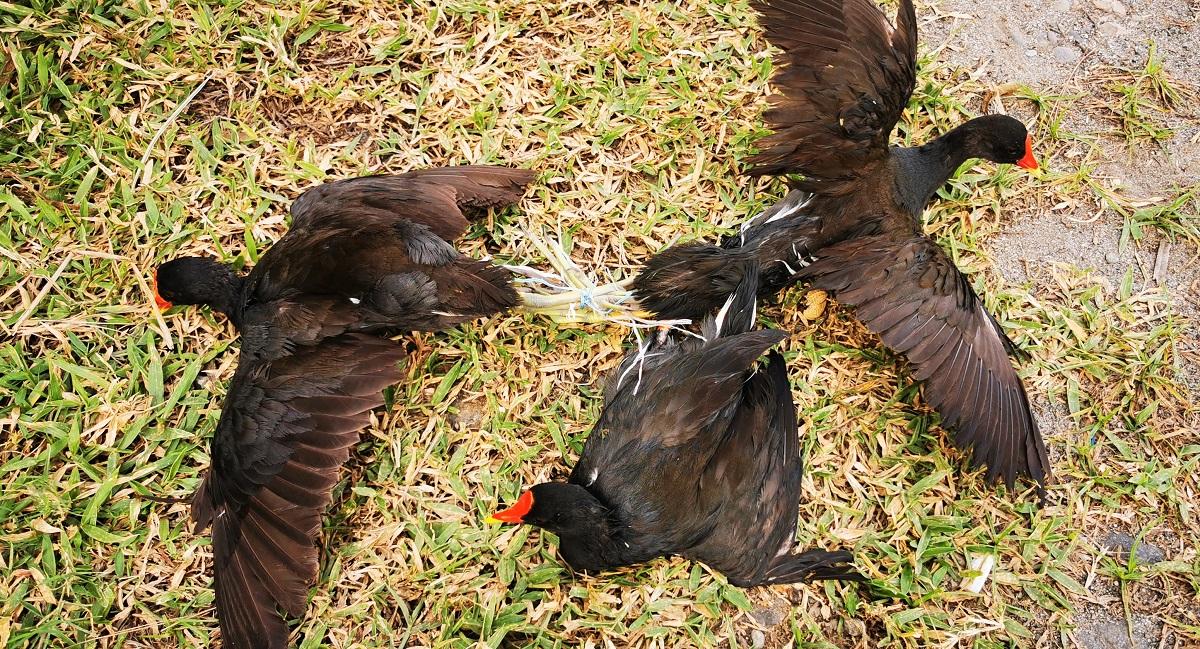DENR alarmed as pandemic forces farmers in S.Kudarat town to sell wild birds

ESPERANZA, Sultan Kudarat — The COVID-19 pandemic has forced farmers in Esperanza town in Sultan Kudarat to sell birds to motorists along the national highway to augment their incomes and allow them to buy rice and other food commodities.
On Friday, farmers were seen at the roadside offering moorhens, locally known as “kuro,” at P50 each.
Moorhens (Gallinulla chloropus) are also known as swamp chickens or water hens. Republic Act 9147 or the Wildlife Resources Conservation and Protection Act prohibits, among others, “engaging in the exchange, exportation, or importation, purchase or sale of wildlife, their derivatives or by-products, locally or internationally.
“There are plenty of kuro in the rice field during our morning visit at the farm, and since we don’t have much this pandemic, we decided to catch them using a trap we improvised to have augment our financial needs,” said Nonoy, not his real name, in the vernacular.
Nonoy said that the prices of basic needs have also increased, especially the meat products.
“So, they might opt to buy a cheaper bird meat,” the farmer added.
A teenage boy with him held up bunches of the birds, their legs tied by string.
Most of their buyers, he said, fry the birds or cook them as adobo.
But bird enthusiasts and wildlife conservation advocates were saddened to see the situation in a social media post.
“It’s a violation of our existing laws, it should be returned into the wild,” said environmentalist Marlon Ceballos.
"Nangyayari ito tuwing krisis. Naalala ko noon nung nagkaroon ng El Niño, madaming pinagbibili na ganito from pawas [marshland]," said Aldwin Apostol, a broadcast journalist from Upi, Maguindanao.
“Dito sa Mlang bawal manghuli ng mga ibon lalo na sa palayan,” said Mlang Vice Mayor Joselito Piñol highlighting a local law that protects wildlife wetland birds.
According to agriculturist Kim Bagundang, the function of these birds in the environment is to control pests.
“Kumakain sila ng mga kulisap sa palayan,” he said. He added that government should intensify and be functional in biodiversity governance.
Dr. Rosalinda Cortez, Chief of the Conservation and Development Division of the Department of Environment and Natural Resources in Region-12, said that immediately after their team noticed a social media post about the bird poaching, they informed their local counterparts to track and possibly apprehend the sellers.
“Immediately I informed our CENRO in Tacurong City, Mr. Larry Curias, to respond immediately but the culprits were gone,” she said.
The site of the illegal selling is at the national highway in Esperanza, Sultan Kudarat.
“Our concern here is not only the violation of the law but impact of misbalancing the biodiversity that could result to other illnesses, these people is possible to be exposed to zoonotic diseases, we are not certain if these birds (sold and eaten) are disease carriers that could infect people,” she said.
The illegal poaching of wildlife animals is seen as a likely source of the coronavirus that causes COVID-19.
Cortez also said that she hopes their Regional Wildlife Rescue Center at Sultan Kudarat State University in Lutayan town will be able to have a wildlife ambulance to be used for the rescue of wildlife such as in this situation. — BM, GMA News



